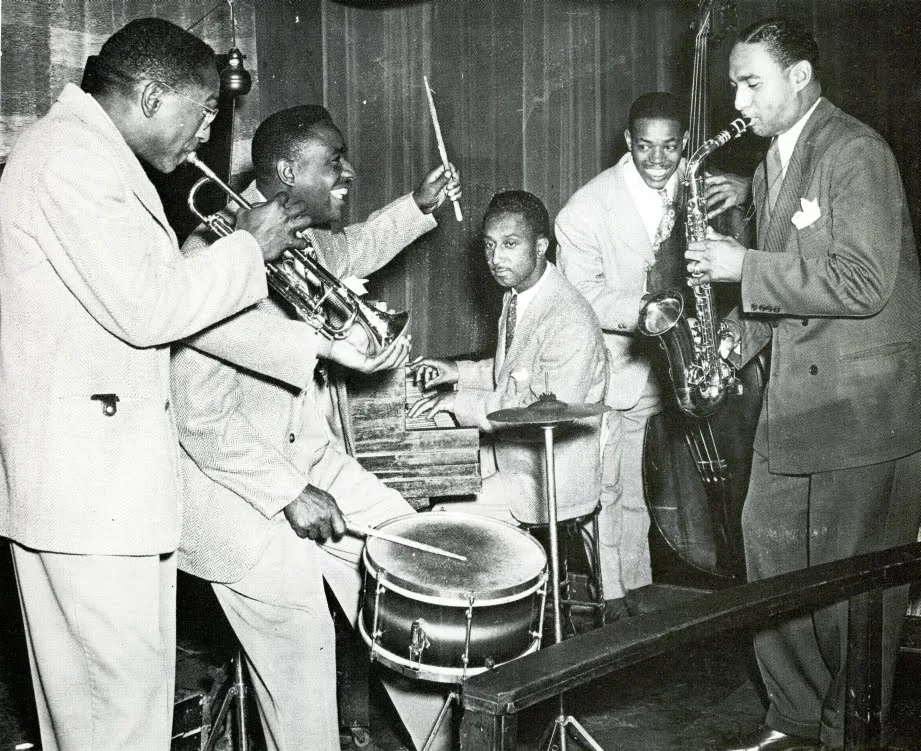JACK McVEA
Jack McVea will always be most famous for his big hit "Open the Door, Richard." Although associated with the R&B world due to that 1946 bestseller, McVea was actually a swing stylist whose fairly mellow sound was a major contrast to the honking tenors of the time. He started out playing banjo as a youth (1925-27) before switching to alto. McVea began playing professionally with his father (banjoist Satchel McVea), Dootise Williams' Harlem Dukes (1932), Charlie Echols (1934-35), Claude Kennedy, Edyth Turnham, Cee Pee Johnson and Eddie Barefield (1936). McVea mostly gigged in the Los Angeles area until joining Lionel Hampton in 1940 as a baritonist. He was with Hamp for three years and played with Snub Mosley, but McVea made a much stronger impression when he played on the first Jazz at the Philharmonic Concert. From 1944 on, McVea led his own group most of the time. He appeared on a Slim Gaillard record date in 1945 that included Dizzy Gillespie and Charlie Parker and was quite popular from 1946-48 after "Open the Door, Richard" became a novelty hit. In the 1950s McVea had a lower profile, continuing to lead his own combo in the Los Angeles area and gigging with Benny Carter in 1956. McVea recorded as a leader for Rhythm, Melodisc, Apollo, Black & White and Exclusive from 1945-47 and for Combo and Ace from 1953-55. He also recorded a jazz album for 77 in 1962. From 1966 until the mid-1980s, McVea led a Dixieland-oriented trio at Disneyland, playing clarinet exclusively. When the Disneyland job ended, he retired from music. Jack McVea died in Los Angeles on December 27, 2000.
Jack McVea (November 5, 1914 -- December 27, 2000) was an American swing, blues, and rhythm and blues woodwind player; he played clarinet and tenor and baritone saxophone. His father was the noted banjoist Satchel McVea, and banjo was Jack McVea's first instrument.
Jack McVea (November 5, 1914 – December 27, 2000 was an African American, swing, blues, and rhythm and blues woodwind player; he played clarinet and tenor and baritone saxophone. His father was the noted banjoist Satchel McVea, and banjo was Jack McVea's first instrument.
Born John Vivian McVea in Los Angeles, California, and playing jazz in Los Angeles for several years, he joined Lionel Hampton's orchestra in 1940. From 1944 on he mostly worked as a leader. Perhaps his most impressive performance as a sideman in those years was at the first Jazz at the Philharmonic concert in 1944.
McVea was leader of the Black & White Records studio band and was responsible for coming up with the musical riff for the words "Open the Door, Richard". Ralph Bass got him to record it in 1946 and it became immensely popular, entering the national charts the following year, and was recorded by many other artists.
From 1966 till his retirement in 1992 he led a group that played Dixieland jazz in New Orleans Square at Disneyland, called The Royal Street Bachelors. When formed, the trio consisted of McVea on clarinet, Herman Mitchell on banjo, and Ernie McLean on guitar and banjo. According to McVea, he was not much of a clarinetist but learned overnight to play three songs to secure the job.
He is also known for his playing on T-Bone Walker's "Call It Stormy Monday (But Tuesday Is Just As Bad)". In 1945 he played tenor sax in a recording session for Slim Gaillard alongside Charlie Parker and Dizzy Gillespie.



Comments